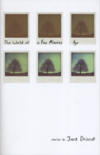The World of a Few Minutes Ago
Jack Driscoll’s short story collection The World of a Few Minutes Ago reflects Michigan’s weather, concentrates on mostly blue-collar workers and trailer inhabitants, and offers a mostly masculine voice but also a beautiful lyrical style, describing the beauty of stars as well as perfectly capturing the lives of his characters and their personality clashes. His story structure is meticulous and convoluted as we twist from the characters’ sad hard lives toward a resolution of acceptance and sometimes release.
Jack Driscoll’s short story collection The World of a Few Minutes Ago reflects Michigan’s weather, concentrates on mostly blue-collar workers and trailer inhabitants, and offers a mostly masculine voice but also a beautiful lyrical style, describing the beauty of stars as well as perfectly capturing the lives of his characters and their personality clashes. His story structure is meticulous and convoluted as we twist from the characters’ sad hard lives toward a resolution of acceptance and sometimes release.
The ten stories sometimes repeat themes—male friendships, low paying jobs, and tender older marriages. Each tale is engaging: Within a loving relationship, the manic wife gets the couple into trouble searching for ever more daring items to steal. A whistleblower slaughterhouse worker must leave town with his family. A macho older hunter, foolishly without a safety harness, falls from his blind and relives his cruelty to his homosexual son. And as part of a 70-year-old couple, a wife suffers from Alzheimer’s while her husband remembers his infidelities as a photojournalist covering wars and executions.
The exact locations in Michigan (only a few are mentioned: Grand Forks, Carp Lake, Sault Sainte Marie, Grayling) are not important. Rather, it is Michigan as a whole that Driscoll knows:
Another day of sunshine and stretches of snow, weather unable to make up its mind . . . only three seasons in northern Michigan: July, August, and winter . . . a sunlit cloudburst of snow turned everything bright white, a Michigan squall . . . wind-whipped road conditions, the shell-sculpted drifts and the whiteouts . . . the all-wheel-drive Subaru floating ghostlike over those treacherous patches of hidden black ice . . . the stone-white sky above those woods . . . the silver light of the star-lanes shines so luminescent you can see the shadows and the silhouettes of deer moving through . . . whenever a cloudbank in a particular shape rolls in, I imagine snowcapped peaks.
Even when it is a woman’s perspective (only twice in the collection) the rough background is identical to the man’s. Most of the lives can be captured in this quote from “The Season of Mercy”:
Prosperity in these parts meant hitting the lotto, and he’d spent plenty trying, playing, week after week, variations on that same unlucky combination of our three birthdays. My mom had forgotten to take in the laundry . . . all of his ankle-length white aprons hanging on the line, one for each working day. I didn’t say so, but they looked like ghost torsos, bleached and slightly billowy from the breeze, and nothing but darkness underfoot.
The young daughter Geneva speaks of her trailer home:
Home is always empty and cold, all pipey with clanks so loud the entire trailer park sounds as though it were freezing solid, with the bare bulbs dimming in their thin copper sockets and every battery in every beater exploding like hand grenades under the hoods. . . . [Of] the house lights, their faint radiance diminishing and pulsing she thinks of candles, and then of someone slowly flicking through signed-off TV channels—that static she sometimes wakes to, like the soft shaking of castanets, and finds her mom, still wearing her waitress uniform, passed out cold on the couch.
In the midst of these hardscrabble lives, the beautiful stars (especially the Corona Borealis) are a frequent image:
Some nights it was so bright I’d turn off my headlight, the giant sprocket of the stars seeming to tumble toward me . . . the nocturnal world in a perpetual slow-motion freefall that never actually fell. And like a certain recurring dream . . . of leaping over buses and railroad cars, suspended above the town like E.T., a diehard sky rider silhouetted against the full moon.
The messages may be “nothing will ever, ever last” or “the dangerous lay of the land, the self-destructive addictions of women and men,” or “my three flings, each short-lived—but then again, what doesn’t seem so anymore?” But these people are resilient. In “This Season of Mercy,” for example, Driscoll’s structure leads to an unexpected resolution. The story opens with a father dressed like a prostitute spending the night in jail. The embarrassing morphs into real fear for this threatened long-time slaughterhouse worker. Much later we learn the reason why. The consequence is that the family, who have never been out of Michigan, must leave the only house they’ve known—but with a kiss and a feeling of grace.
This beautifully written collection will resonate with all, but especially with Michigan readers.





